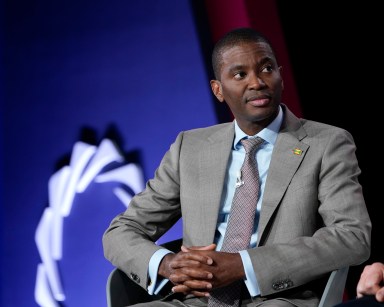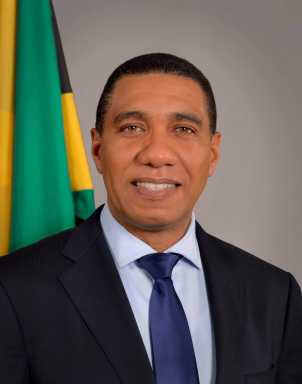Listeners:
Top listeners:
-
play_arrow
RadioJLR Just Press Play
As he handed over the chairpersonship of the 15-nation Caribbean Community to Mia Mottley of Barbados, Grenada’s Prime Minister Dickon Mitchell told the European Union that it could not avoid making reparation payments for the crimes linked to the trans-Atlantic slave trade.
Making his remarks as immediate past bloc chair, Mitchell was blunt in his assessment of the situation, telling the audience at last week’s summit in Barbados that the issue remains a top priority on the regional agenda. In the audience, of course, was European Commission President Ursula von der Leyen, who was among the special invitees to the three-day summit. Like the others, she sat and took in Mitchell’s remarks as he formally ended his six months as chairman of the grouping.
“The issue of reparations for the transatlantic slavery and the enslavement of African peoples and black bodies, as my comrade Ralph Gonsalves (of St. Vincent) likes to say, is an issue that we will take up with you, and we are doing so in hands of partnership, and we are doing so in the cause of humanity because as long as we do not openly and explicitly reject the idea that one human being can own another human being, we run the risk that idea may somehow take root again,” he said.
He argued that the region has a responsibility to its people to fight for reparations and its designation as crimes against humanity as he demanded a formal apology, compensation, and a pledge that “such atrocities must never occur again.”
For her part, Von der Leyen avoided the question of reparations but did say that “slavery is a crime against humanity and the dignity and universal rights of every single human being is untouchable and must be defended by all means.”
The bloc has been upping the ante to hold former slave trading nations accountable for slavery and did manage to put Britain under severe pressure at last year’s Commonwealth leaders summit in Samoa as the Caribbean led the fight for a formal discussion of the issue with the support of some African nations.
Leaders have also been pressuring the EU to sit down and formally discuss a range of issues, including reparations and slavery, the blacklisting of some nations for allegedly failing to comply with financial compliance issues like money laundering and climate change.
In this regard, Antiguan Prime Minister Gaston Browne says he and other leaders had managed to propose the establishment of a formal mechanism for structured engagements with the US to the commission president at the Barbados meeting.
“I recommended that there should be a CARICOM-European summit. And she accepted. So, it seems as though that in the future, we’ll have an institutionalized forum to have more structured discussions with the European Union, rather than to have an ad hoc visit,” Browne said on a weekend radio program. “She did say that they were concerned about a particular country that had violated and created some consternation for the Europeans. But otherwise, she understands the need for there to be better dialogue, greater cooperation, and collaboration between CARICOM and the European Union.”
The latest airing of grievances relating to the slave trade comes as Antigua has stepped up pressure on Harvard University to own up to its links to the colonial era atrocity.
The government there has formally written to university leadership to not only own up to the past but also to be prepared to make reparation payments linked to financial donations from the plantation system in Antigua, which gave Harvard its early financial beginning.
“The people of Antigua and Barbuda are not seeking mere symbolic gestures but substantive and meaningful engagement,” the letter states. “Harvard has an opportunity to lead by example in the global reparatory justice movement – through deepened and sustained commitment,” said the missive from the government.
PM Browne was even more strident with Harvard, noting that “we are not asking for favors. We are seeking justice for the people whose suffering built Harvard into what it is today.
Harvard University, particularly its Law School, was established with funding from slavery on Antigua’s plantations. Our ancestors worked for centuries without pay, and their labor fueled Harvard’s early development. It’s time for them to acknowledge this with meaningful action,” he said.
Written by: Adm
Similar posts
© 2025. All Rights Reserved by Radio-JLR




Post comments (0)